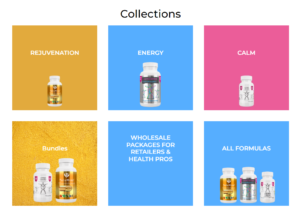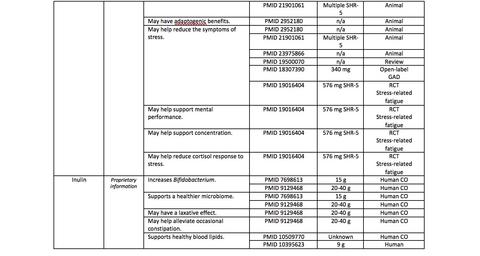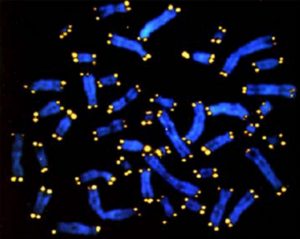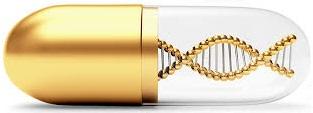
The name TeloMind™ stands for "Telomeres" and "Mind". We are often asked why we chose this name, when we first created TeloMind in 2016?
Your telomeres are sections of DNA found at the end of each of your chromosomes. These are like little caps which serve to protect you. They are often compared to the plastic protective tips in shoelaces that protect a shoelace from unravelling. In this same way, telomeres play an important role in protecting the DNA and keeping it stable.
During your lifetime, your telomeres get shorter and shorter and this is the basic reason why you age.
With every cell division, a small part of your telomeres is not copied and this causes them to gradually shrink. Shorter telomeres cause your DNA to become unstable and then you are prone to disease.
The shorter your telomeres, the older you become biologically; while the opposite is also true. The longer your telomeres, the younger your cells are biologically; and the better your health.
The second part of our name represents the difference TeloMind™ makes to your mind, through managing the stress hormone cortisol. This enables you to benefit from positive mood, deep restful sleep, focus and concentration.
In fact, TeloMind, AminoBoosters, and AminoSerene all impact telomere length because they all influence rejuvenation, due to the full clinical therapeutic dose in every serving of these three extraordinary formulas.
International speaker and coach Barbie Layton, age 48 from California, saw her telomere age change from 84 to 53 in just 12 months when using AminoBoosters, despite having a chronic incurable disease.
Our three Young Tissue Extract formulas are
- AminoBoosters
- AminoSerene
- and TeloMind
AminoBoosters and TeloMind contain clinical dose Young Tissue Extract.
AminoBoosters and TeloMind have similar formulas, with TeloMind also containing the important herb Rhodiola rosea, which has traditional usage as an anti-fatigue agent, an adaptogen, and to improve cognitive functioning. Rhodiola rosea is also potentially highly neuroprotective against toxins. In the brain, Rhodiola rosea appears to be highly serotonergic (increases serotonin) and reduces corticosteroids. Rhodiola may also promote longevity, with preliminary evidence suggesting up to a 20% increase in lifespan.
See more about Barbie Layton's story here: https://healthevolutionproject.com/benefits
For additional information, here's the TeloMind Substantiation Document, provided by our independent Dietary Supplement Experts as part of our due diligence during the formulation preparation process. For your convenience, the telomere information is highlighted:
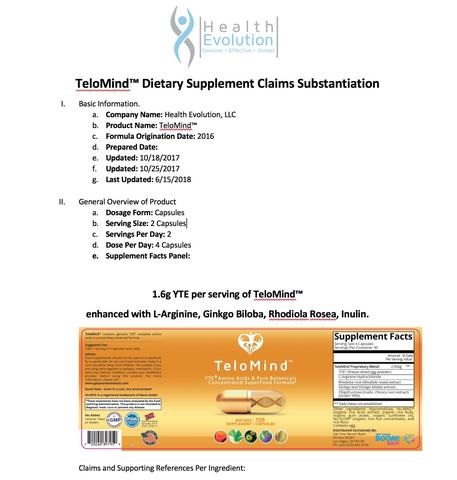
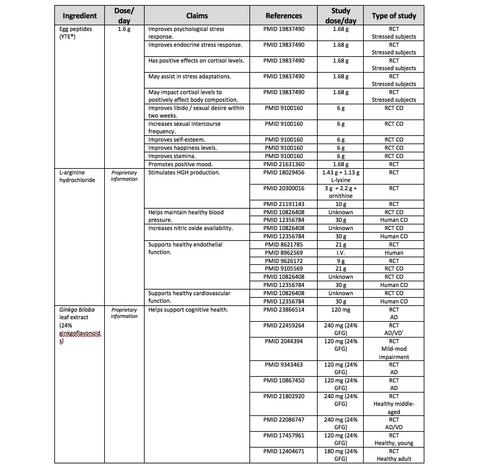
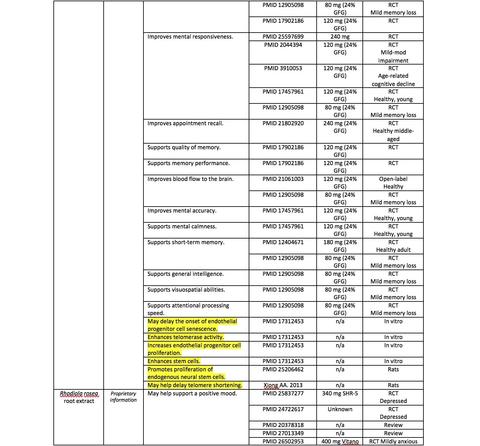
Of course, there are many research papers and reports regarding how chronic stress shortens telomeres.
Clinical evidence demonstrates how Young Tissue Extract in particular, additionally supported by other ingredients in our formulas, modulates cortisol, the "stress hormone", positively impacting the reduction of chronic stress, and positively affecting telomeres.
FURTHER INFORMATION ON HOW CHRONIC STRESS SHORTENS TELOMERES - AND REDUCING CHRONIC STRESS LENGTHENS TELOMERES
As reported in the American Institute of Stress:
"Stress, Aging, and Telomeres
All the cells in our body contain tiny clocks called telomeres that can determine how long they will live. Telomeres are little caps at the end of chromosomes that prevent loss or injury to genetic information during cell division. Each time a cell divides, part of the telomere is lost and it becomes shorter. When a telomere eventually disappears because of repeated cell divisions, chromosomal damage prevents the cell from accurately reproducing itself. This shortening and eventual erosion of telomeres are prevented or reduced by telomerase, an enzyme in cells that preserves their length. Many believe that telomere destruction and reconstruction is related to the balance between aging and cancer and explains why cancer is more common in the elderly.
In the illustration to the left, chromosomes are stained blue and the protective telomere caps at their ends are stained yellow. Cells with long telomeres live longer. Short telomeres have been linked to a wide range of human diseases, including coronary heart disease, osteoporosis, and HIV infection. Shortening of telomeres is prevented or reduced by telomerase, which has been shown to keep immune cells young by preserving their length and ability to continue to divide and reproduce accurate replicas.
UCLA researchers recently confirmed prior reports that people subjected to chronic stress tended to have shorter telomeres. They have now uncovered a mechanism that explains how stress causes telomere shortening, hence the well-known links between stress and heart disease, as well as accelerated aging. Cells with long telomeres live longer. Short telomeres have been linked to a wide range of human diseases, including coronary heart disease, osteoporosis, and HIV infection. Shortening of telomeres is prevented or reduced by telomerase, which has been shown to keep immune cells young by preserving their length and ability to continue to divide and reproduce accurate replicas.
Chronic stress results in increased secretion of cortisol that causes a rise in blood sugar and blood pressure and reduces inflammation and immune system resistance to infection. However, this new study shows that cortisol also suppresses telomerase activation in immune system cells so that telomeres are no longer protected during cell division and become progressively shorter. This leads to early cell aging and distorted replicas of the original cell that could lead to cancer and other diseases. As the lead author noted in an interview, “We are testing therapeutic ways of enhancing telomerase levels to help the immune system ward off cortisol’s effect. If we’re successful, one day a pill may exist to strengthen the immune system’s ability to weather chronic emotional stress.”"
This study was approved by the UCLA Institutional Review Board:
Choi J. Fauce SR, Effros RB. Reduced telomerase activity in human T lymphocytes exposed to cortisol. Brain Behavior and Immunity May 2008; 22:600-605 - https://www.ncbi.nlm.nih.gov/pubmed/18222063 - https://www.ncbi.nlm.nih.gov/pmc/articles/PMC2386249/
Also see References:
- Akbar AN, Vukmanovic-Stejic M. Telomerase in T lymphocytes: use it and lose it? J Immunol. 2007;178:6689–6694. [PubMed] [Google Scholar]
- Buchkovich KJ, Greider CW. Telomerase regulation during entry into the cell cycle in normal human T cells. Mol Biol Cell. 1996;7:1443–1454. [PMC free article] [PubMed] [Google Scholar]
- Cacioppo JT, Kiecolt-Glaser JK, Malarkey WB, Laskowski BF, Rozlog LA, Poehlmann KM, et al. Autonomic and glucocorticoid associations with the steady-state expression of latent Epstein-Barr virus. Horm Behav. 2002;42:32–41. [PubMed] [Google Scholar]
- Cao W. PhD Thesis. 2007. Immunological Factors Associated with HIV-1 Disease Progression to AIDS and Death. [Google Scholar]
- Dagarag MD, Evazyan T, Rao N, Effros RB. Genetic manipulation of telomerase in HIV-specific CD8+ T cells:enhanced anti-viral functions accompany the increased proliferative potential and telomere length stabilization. J Immunol. 2004;173:6303–6311. [PubMed] [Google Scholar]
- Damjanovic AK, Yang Y, Glaser R, Kiecolt-Glaser JK, Nguyen H, Laskowski B, Zou Y, Beversdorf DQ, Weng NP. Accelerated telomere erosion is associated with a declining immune function of caregivers of Alzheimer's disease patients. J Immunol. 2007;179:4249–4254. [PMC free article] [PubMed] [Google Scholar]
- Effros RB, Dagarag MD, Spaulding CC, Man J. The role of CD8 T cell replicative senescence in human aging. Immunological Reviews. 2005;205:147–157. [PubMed] [Google Scholar]
- Epel ES, Blackburn EH, Lin J, Dhabhar FS, Adler NE, Morrow JD, et al. Accelerated telomere shortening in response to life stress. Proc Natl Acad Sci U S A. 2004;101:17312–17315. [PMC free article] [PubMed] [Google Scholar]
- Epel ES, Lin J, Wilhelm FH, Wolkowitz OM, Cawthon R, Adler NE, et al. Cell aging in relation to stress arousal and cardiovascular disease risk factors. Psychoneuroendocrinology. 2006;31:277–287. [PubMed] [Google Scholar]
- Gayrard V, Alvinerie M, Toutain PL. Interspecies variations of corticosteroid-binding globulin parameters. Domest Anim Endocrinol. 1996;13:35–45. [PubMed] [Google Scholar]
- Goronzy JJ, Fulbright JW, Crowson CS, Poland GA, O'Fallon WM, Weyand CM. Value of immunological markers in predicting responsiveness to influenza vaccination in elderly individuals. J Virol. 2001;75:12182–12187. [PMC free article] [PubMed] [Google Scholar]
- Harley C, Futcher AB, Greider C. Telomeres shorten during ageing of human fibroblasts. Int Immunol. 1990;345:458–460. [PubMed] [Google Scholar]
- Haynes L, Swain SL. Why aging T cells fail: implications for vaccination. Immunity. 2006;24:663–666. [PubMed] [Google Scholar]
- Kiecolt-Glaser JK, Glaser R, Gravenstein S, Malarkey WB, Sheridan J. Chronic stress alters the immune response to influenza virus vaccine in older adults. Proc Natl Acad Sci U S A. 1996;93:3043–3047. [PMC free article] [PubMed] [Google Scholar]
- Leserman J, Petitto JM, Gu H, Gaynes BN, Barroso J, Golden RN, et al. Progression to AIDS, a clinical AIDS condition and mortality: psychosocial and physiological predictors. Psychol Med. 2002;32:1059–1073. [PubMed] [Google Scholar]
- Liu K, Hodes RJ, Weng N. Cutting edge: telomerase activation in human T lymphocytes does not require increase in telomerase reverse transcriptase (hTERT) protein but is associated with hTERT phosphorylation and nuclear translocation. J Immunol. 2001;166:4826–4830. [PubMed] [Google Scholar]
- Mehta SK, Stowe RP, Feiveson AH, Tyring SK, Pierson DL. Reactivation and shedding of cytomegalovirus in astronauts during spaceflight. J Infect Dis. 2000;182:1761–1764. [PubMed] [Google Scholar]
- Pawelec G, Akbar A, Caruso C, Effros RB, Grubeck-Loebenstein B, Wikby A. Is immunosenescence infectious? Trends Immunol. 2004;25:406–410. [PubMed] [Google Scholar]
- Plunkett FJ, Soares MV, Annels N, Hislop A, Ivory K, Lowdell M, et al. The flow cytometric analysis of telomere length in antigen-specific CD8+ T cells during acute Epstein-Barr virus infection. Blood. 2001;97:700–707. [PubMed] [Google Scholar]
- Simon NM, Smoller JW, McNamara KL, Maser RS, Zalta AK, Pollack MH, et al. Telomere shortening and mood disorders: preliminary support for a chronic stress model of accelerated aging. Biol Psychiatry. 2006;60:432–435. [PubMed] [Google Scholar]
- Stowe RP, Mehta SK, Ferrando AA, Feeback DL, Pierson DL. Immune responses and latent herpesvirus reactivation in spaceflight. Aviat Space Environ Med. 2001;72:884–891. [PubMed] [Google Scholar]
- Valenzuela HF, Effros RB. Divergent telomerase and CD28 expression patterns in human CD4 and CD8 T cells following repeated encounters with the same antigenic stimulus. Clin Immunol. 2002;105:117–125. [PubMed] [Google Scholar]
- Van Laethem F, Baus E, Smyth LA, Andris F, Bex F, Urbain J, et al. Glucocorticoids attenuate T cell receptor signaling. J Exp Med. 2001;193:803–814. [PMC free article] [PubMed] [Google Scholar]
- Weng NP, Palmer LD, Levine BL, Lane HC, June CH, Hodes RJ. Tales of tails: regulation of telomere length and telomerase activity during lymphocyte development, differentiation, activation, and aging. Immunological Reviews. 1997;160:43–54. [PubMed] [Google Scholar]
- Yang EV, Glaser R. Stress-induced immunomodulation: impact on immune defenses against infectious disease. Biomed Pharmacother. 2000;54:245–250. [PubMed] [Google Scholar]
- Lineage-specific telomere shortening and unaltered capacity for telomerase expression in human T and B lymphocytes with age.[J Immunol. 2000]
- [Telomerase activity and telomere length in CD4+,CD8+ and CD19+ lymphocytes from patients with systemic lupus erythematosus].[Zhejiang Da Xue Xue Bao Yi Xue...]
- An antiapoptotic role for telomerase RNA in human immune cells independent of telomere integrity or telomerase enzymatic activity.[Blood. 2014]
- Telomerase induction in T cells: a cure for aging and disease?[Exp Gerontol. 2007]
- Tales of tails: regulation of telomere length and telomerase activity during lymphocyte development, differentiation, activation, and aging.[Immunol Rev. 1997]
- Fetal Membrane Architecture, Aging and Inflammation in Pregnancy and Parturition[Placenta. 2018]
- Sex-specific effects of the in ovo environment on early-life phenotypes in eiders[Oecologia. 2019]
- Differential gene expression profile analysis in corticosterone-treated PC12 cells[International Journal of Clini...]
- The relationship between neighborhood socioeconomic deprivation and telomere length: The 1999–2002 National Health and Nutrition Examination Survey[SSM - Population Health. 2019]
- Impact of continuous predator threat on telomere dynamics in parent and nestling pied flycatchers[Oecologia. 2019]
- Reduced telomerase activity in human T lymphocytes exposed to cortisolReduced telomerase activity in human T lymphocytes exposed to cortisolNIHPA Author Manuscripts. 2008 May; 22(4)600
- Reduced telomerase activity in human T lymphocytes exposed to cortisol.Reduced telomerase activity in human T lymphocytes exposed to cortisol.Brain Behav Immun. 2008 May;22(4):600-5. doi: 10.1016/j.bbi.2007.12.004. Epub 2008 Jan 25.
- Divergent telomerase and CD28 expression patterns in human CD4 and CD8 T cells following repeated encounters with the same antigenic stimulus.[Clin Immunol. 2002]
- Review The role of CD8+ T-cell replicative senescence in human aging.[Immunol Rev. 2005]
- Interspecies variations of corticosteroid-binding globulin parameters.[Domest Anim Endocrinol. 1996]
- Divergent telomerase and CD28 expression patterns in human CD4 and CD8 T cells following repeated encounters with the same antigenic stimulus.[Clin Immunol. 2002]
- Review Telomerase in T lymphocytes: use it and lose it?[J Immunol. 2007]
- Review The role of CD8+ T-cell replicative senescence in human aging.[Immunol Rev. 2005]
- Divergent telomerase and CD28 expression patterns in human CD4 and CD8 T cells following repeated encounters with the same antigenic stimulus.[Clin Immunol. 2002]
- Accelerated telomere shortening in response to life stress.[Proc Natl Acad Sci U S A. 2004]
- Cutting edge: telomerase activation in human T lymphocytes does not require increase in telomerase reverse transcriptase (hTERT) protein but is associated with hTERT phosphorylation and nuclear translocation.[J Immunol. 2001]
- The flow cytometric analysis of telomere length in antigen-specific CD8+ T cells during acute Epstein-Barr virus infection.[Blood. 2001]
- Telomerase regulation during entry into the cell cycle in normal human T cells.[Mol Biol Cell. 1996]
- Accelerated telomere shortening in response to life stress.[Proc Natl Acad Sci U S A. 2004]
- Cell aging in relation to stress arousal and cardiovascular disease risk factors.[Psychoneuroendocrinology. 2006]
- Accelerated telomere erosion is associated with a declining immune function of caregivers of Alzheimer's disease patients.[J Immunol. 2007]
- Glucocorticoids attenuate T cell receptor signaling.[J Exp Med. 2001]
- Genetic manipulation of telomerase in HIV-specific CD8+ T cells: enhanced antiviral functions accompany the increased proliferative potential and telomere length stabilization.[J Immunol. 2004]
- Review Telomerase in T lymphocytes: use it and lose it?[J Immunol. 2007]
- Review The role of CD8+ T-cell replicative senescence in human aging.[Immunol Rev. 2005]
- Divergent telomerase and CD28 expression patterns in human CD4 and CD8 T cells following repeated encounters with the same antigenic stimulus.[Clin Immunol. 2002]
- Review Is immunosenescence infectious?[Trends Immunol. 2004]
- Value of immunological markers in predicting responsiveness to influenza vaccination in elderly individuals.[J Virol. 2001]
- Review Is immunosenescence infectious?[Trends Immunol. 2004]
- Immune responses and latent herpesvirus reactivation in spaceflight.[Aviat Space Environ Med. 2001]
- Reactivation and shedding of cytomegalovirus in astronauts during spaceflight.[J Infect Dis. 2000]
- Review Why aging T cells fail: implications for vaccination.[Immunity. 2006]
- Progression to AIDS, a clinical AIDS condition and mortality: psychosocial and physiological predictors.[Psychol Med. 2002]
- Review The role of CD8+ T-cell replicative senescence in human aging.[Immunol Rev. 2005]
- Autonomic and glucocorticoid associations with the steady-state expression of latent Epstein-Barr virus.[Horm Behav. 2002]
- Accelerated telomere shortening in response to life stress.[Proc Natl Acad Sci U S A. 2004]
- Accelerated telomere erosion is associated with a declining immune function of caregivers of Alzheimer's disease patients.[J Immunol. 2007]
- Chronic stress alters the immune response to influenza virus vaccine in older adults.[Proc Natl Acad Sci U S A. 1996]
- Review Stress-induced immunomodulation: impact on immune defenses against infectious disease.[Biomed Pharmacother. 2000]
Link to the Science pages:
- regarding Young Tissue Extract
- regarding the other ingredients in our formulasEvidence-based efficacy of adaptogens in fatigue, and molecular mechanisms relat...Evidence-based efficacy of adaptogens in fatigue, and molecular mechanisms related to their stress-protective activity.Curr Clin Pharmacol. 2009 Sep;4(3):198-219. Epub 2009 Sep 1.The cumulative cost of additional wakefulness: dose-response effects on neurobeh...The cumulative cost of additional wakefulness: dose-response effects on neurobehavioral functions and sleep physiology from chronic sleep restriction and total sleep deprivation.Sleep. 2003 Mar 15;26(2):117-26.The Effects of Powdered Fertilized Eggs on DepressionThe Effects of Powdered Fertilized Eggs on DepressionJournal of Medicinal Food. 2011 Jul; 14(7-8)870
You can get your telomeres tested by a variety of companies online including
Find out more with our FREE Telomeres Information Booklet available to read, download, and print, here healthevolutionproject.com/pages/telomind-brochure.
Place your order now and see the difference it can make, either ordering one of our stand-alone supplements or the Ultimate Health 30 Day System, here:
